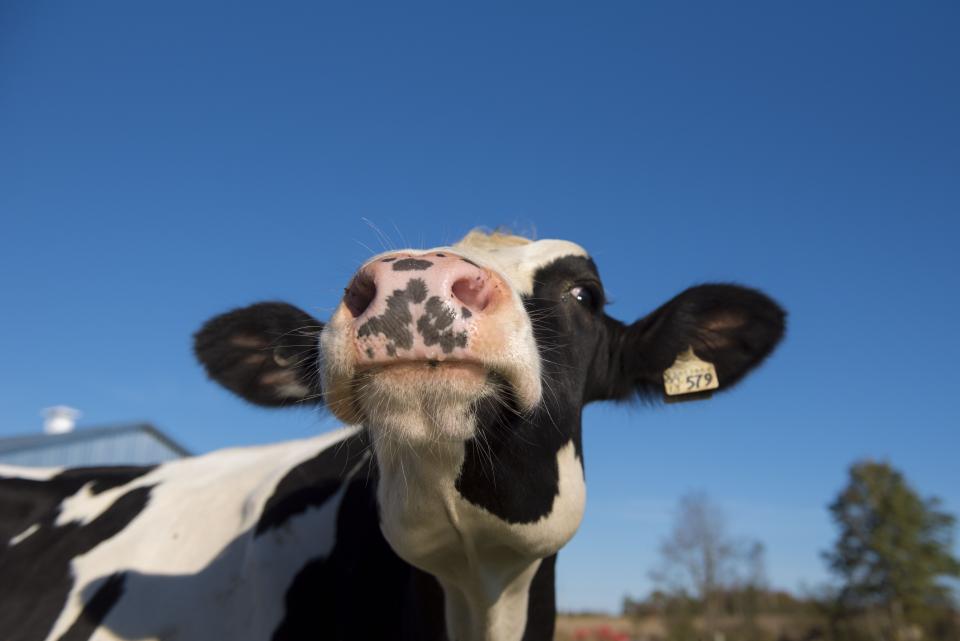Canadians rightfully pay close attention to what’s in their food and how it’s made. As such, many may wonder if milk contains added hormones. Here are a few facts about artificial or synthetic growth hormones and why they’re not permitted for use on Canadian dairy farms.
Naturally occurring growth hormones
Hormones are chemical messengers that have various effects in the body. In fact, hormones are responsible for regulating and integrating the processes of reproduction, growth and development in animals, plants and, of course, humans.1
The growth hormone, also referred to as somatotropin, is a naturally occurring substance produced by somatotropic cells located in the pituitary gland of humans and animals.1,2 Bovine somatotropin (bST), which occurs naturally in cattle, is responsible for their skeletal, organ, and cell growth.2
Artificial or synthetic growth hormones
There are also artificial or synthetic hormones, which are produced in a laboratory and whose structure is similar to that of naturally occurring hormones. For example, there is an analogue or synthetic version of bST called recombinant bovine somatotropin (rbST).2,3
This artificial growth hormone, as the name suggests, is designed to speed up the animals’ growth. The results of a Canadian meta-analysis commissioned by Health Canada indicate that rbST also increased milk production by 11.3% in primiparous cows (giving birth or calving for the first time) and by 15.6% in multiparous cows (which have calved more than once), although there was considerable variation between studies.4 As this meta-analysis also indicated an increased risk to the cows’ health and well-being, rbST was not authorized for dairy cows in Canada.2,3 In fact, this increased risk is the reason why Health Canada decided not to approve the product in Canada. Its sale and use are de facto prohibited.
Commercial use of rbST is, however, permitted in the United States to increase milk production in dairy cows.2,5 Consequently, dairy products imported from the United States may contain milk from cows that have been treated with rbST.
In practice
- Bovine somatotropin (bST) occurs naturally in cattle, whereas recombinant bovine somatotropin (rbST) is the artificial or synthetic version of bST.
- rbST is prohibited in Canada. As a result, Canadian milk and dairy products are produced without rbST. However, rbST is authorized in the United States.
Why is the use of rbST not permitted in Canada?
In 1998, Health Canada established two expert panels to thoroughly review rbST.4 The Royal College of Physicians and Surgeons of Canada examined the effects of the use of rbST in dairy cattle on human health, while the Canadian Veterinary Medical Association reviewed data related to the effectiveness of rbST and the potential effects on animal health.4,6 The experts used a series of meta-analyses to combine the results of all the clinical trials provided by Health Canada from the documents submitted by the manufacturer for registration of rbST in Canada.4
The experts concluded that the use of rbST poses no risk to human health.2,6 In fact, it is authorized in the United States and in other countries, where it is considered safe.5 However, Health Canada decided not to approve rbST in 1999 due to animal health and welfare concerns.2 Specifically, rbST can increase the risk of certain diseases in cows, such as mastitis, infertility, and lameness.7 As such, to prevent potential health issues in dairy cows, the use of rbST is prohibited in Canada and in all European Union countries.3,5
References
- Marieb EN and Hoehn K. Anatomie et physiologie humaines, 5e édition, Éditions du renouveau pédagogique, 2015, chapitre 16, Le système endocrinien, p. 696 et 709.
- Government of Canada. Questions and Answers - Hormonal Growth Promoters. www.canada.ca. Accessed November 20, 2021.
- Government of Canada. Recombinant Bovine Somatotropin (rbST). www.canada.ca. Accessed November 20, 2021.
- Dohoo IR et al. A meta-analysis review of the effects of recombinant bovine somatotropin. 1. Methodology and effects on production. Can J Vet Res 2003;67:241-251.
- Collier RJ and Bauman DE. Update on human health concerns of recombinant bovine somatotropin use in dairy cows. J Anim Sci 2014;92:1800-1807.
- Government of Canada. Report of the Royal College of Physicians and Surgeons of Canada Expert Panel on Human safety of RBST. www.canada.ca. Accessed October 29, 2021.
- Dohoo IR et al. A meta-analysis review of the effects of recombinant bovine somatotropin. 2. Effects on animal health, reproductive performance, and culling. Can J Vet Res 2003;67:252-264.


